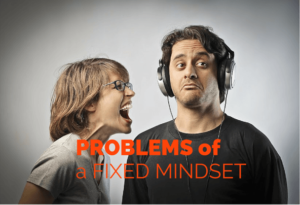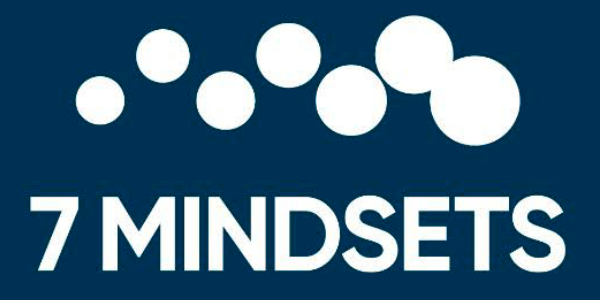A Mix of Growth and Fixed Mindsets
Have Gotten Us Where We Are
Understanding the differences between a fixed minds et and a growth mindset are key to each of us getting where we want to be in life.
et and a growth mindset are key to each of us getting where we want to be in life.
By Jeff Waller, 7 Mindsets Author and Co-Creator
In our research, we came across enlightening insights in the work of Dr. Carol Dweck. In her book, Mindset, she describes having a “fixed” mindset as, “attaching one’s sense of self-worth to extrinsic or fixed accomplishments such as academic scores, trophies, or professional status.” The exact opposite of a fixed mindset is a growth mindset, in which the growth we experience throughout our lives is what we value the most.
We live in an extrinsic world, and we’re conditioned to value and prioritize things that are external from us. We celebrate fame, victory, and fortune, while we criticize failure and pity those who don’t display the accepted indicators of success.
These seem like fairly rational perspectives in our society, and many see them as healthy, motivational forces that drive higher levels of achievement. The reality is that these forces are driving down our levels of happiness.
How Mindsets Meet Failure
An easy example of the difference can be seen in how each mindset reacts to failure. With a fixed mindset, failing is seen in light of what has been lost or not achieved and as an example of our own inadequacy. With a growth mindset, however, failure is viewed as an opportunity to learn from the attempt and gain new perspective from the experience.
When viewed in comparison, it’s clear that a growth mindset is what we want for ourselves and hope to impart to our children. With more and more schools catching on, Dweck’s work has been a major driver for social-emotional learning in schools.
For children, grades, trophies and medals cease to be primary motivators, and status and recognition lose significance. The person we’re becoming is at the core of every experience.
Here Are the 3 Big Problems of a Fixed Mindset:
1. It Decreases Self-knowledge
Probably the most damaging effect of a fixed mindset is that the emphasis on external rewards and validations takes attention away from internal development. In our research of the great thinkers, philosophers and teachers throughout history, a common theme was that one key to happiness is an acute awareness of oneself. It is only through self-knowledge that we create authenticity in our lives, and only through objective examination of our lives that we can truly progress.
By constantly striving for external recognition and signs of success, we find ourselves deceiving others and distracting ourselves from who we truly are. The small percentage of people who seek such validation for status’ sake and actually achieve it eventually find that it only provides a short-term, temporary rush. Even worse, most reach a point in life where they recognize the lack of fulfillment that their status-seeking mindset has yielded and find themselves grappling with the vision of their life as a wasted opportunity to live authentically.
This recognition–often thought of as a mid-life crisis–has accelerated its pace considerably in the past decade or so to the point that the “quarter-life crisis” is now discussed with alarming frequency. By implementing a growth mindset, we learn to gain validation from within. We are no longer measuring our worth based on external demonstrations of success and achievement, and our emotions are no longer connected to transient symbols of societal status.
Our effort and energy will be focused on a constant state of becoming as our attention orients inward. This will lead to an ever-growing self-knowledge that is the foundation of the elusive “authentic life.”
2. It inhibits risk-taking
All of us know that taking risks is an essential part of success. No one has ever achieved anything, whether love, adventure, or financial triumph, without putting it on the line in some manner. And the main inhibitor of risk taking–fear–usually centers on concern over failure, which is, again, fixed mindset territory.
Fixed mindset thinking hinders risk-taking and being vulnerable through fear of the perceived price of failure. The problem is, while failure can certainly hurt, it’s not nearly as damaging as a life that involves settling for less due to fear of taking chances. To paraphrase Benjamin Franklin, “You can choose security or freedom in life, and if you choose security, you will have neither.”
When we play it safe, we limit the experiences and richness of our lives. We don’t allow ourselves the vulnerability that helps us build meaningful relationships. We undermine the creativity that incites and energizes accomplishments that are uniquely our own. We chase an elusive state of stability that doesn’t actually exist, and secure nothing but a future filled with regret over our unrealized potential.
In all of our research, we never came across an individual who didn’t point to a moment of great adversity or failure as the catalyst for their greatest personal achievements of their lives. These challenging and sometimes dark moments helped crystallize the resolve, determination and courage they needed to attain ultimate happiness and success (in whatever form it may have taken).
By developing a growth mindset, we begin to understand that life is not about building walls against uncertainty and disaster; it is about plunging ahead past fear and discomfort towards new experiences and greater self-knowledge.
3. It Causes Unhealthy Competition
Many years ago, when I was dabbling (unsuccessfully) in the stock market, I learned the concept of the “zero-sum game.” It’s a simple idea that essentially meant that my loss was someone else’s gain.
Will Ferrell’s portrayal of Ricky Bobby in the movie Talladega Nights offers a humorous take on this with his mantra, “If you’re not first, you’re last.” That’s how I felt when I invested; either I won or I lost, and tallying them determined my intelligence and savvy. Connecting my worth to that scorecard is the essence of the fixed mindset.
Winning has been the primary motivator in our society for ages. Athletes jeopardize their careers by taking performance-enhancing drugs to gain an edge, while investors risk legal consequences by capitalizing on inside information for the same reason. The “win at all costs” mentality has created criminals out of good people and enemies of those who could be friends. Even worse, it has guided us to focus on external successes over individual growth.
Competition is a wonderful thing, because it can motivate and inspire us to our highest levels of performance and growth. The very competitor you despise may just be the person doing the most to improve the trajectory of your life. The critic whose opinions make you tighten and clench might actually provide you with valuable insights that will help you become better at what you want to do.
Try to apply a growth mindset to the process of competition, and savor what you’re learning about the experience and yourself in the process, rather than aiming merely toward victory. To put it in perspective, my investing experience was teaching me volumes about the behaviors of the market, what drives sudden changes, and how to recognize when I was following a false trend rather than my authentic ideas.
That doesn’t mean I’d be a world-class trader today, but being focused exclusively on what I was making or losing subverted a great opportunity to learn more about myself and expand my knowledge… if only I’d had a growth mindset at the time.
Fixed mindsets make us hypersensitive to lack and scarcity. We see reality TV stars making millions and feel we have to do something extraordinary and highly public with our lives or we are somehow failing. We compare ourselves to external ideals in every aspect of life… our jobs, our bodies, the people we associate with, and the fortunes we amass.
As they say, we end up working at jobs we don’t enjoy so we can spend money we don’t have on things we don’t need to impress people we don’t really like.
Waking up with appreciation for our lives, seeking to learn and grow each day with people we enjoy being around, and doing work and activities that inspire us creates the foundation of true fulfillment. Connecting our value to external measures is irrational, because the meaningless validation we may gain will never bring us lasting satisfaction. By moving beyond a fixed mindset and adopting a growth mindset, we can start living the authentic lives we were meant to live.
“Life is about being and becoming, not having and getting.”
– Stephanie Seabrook Hedgepath



